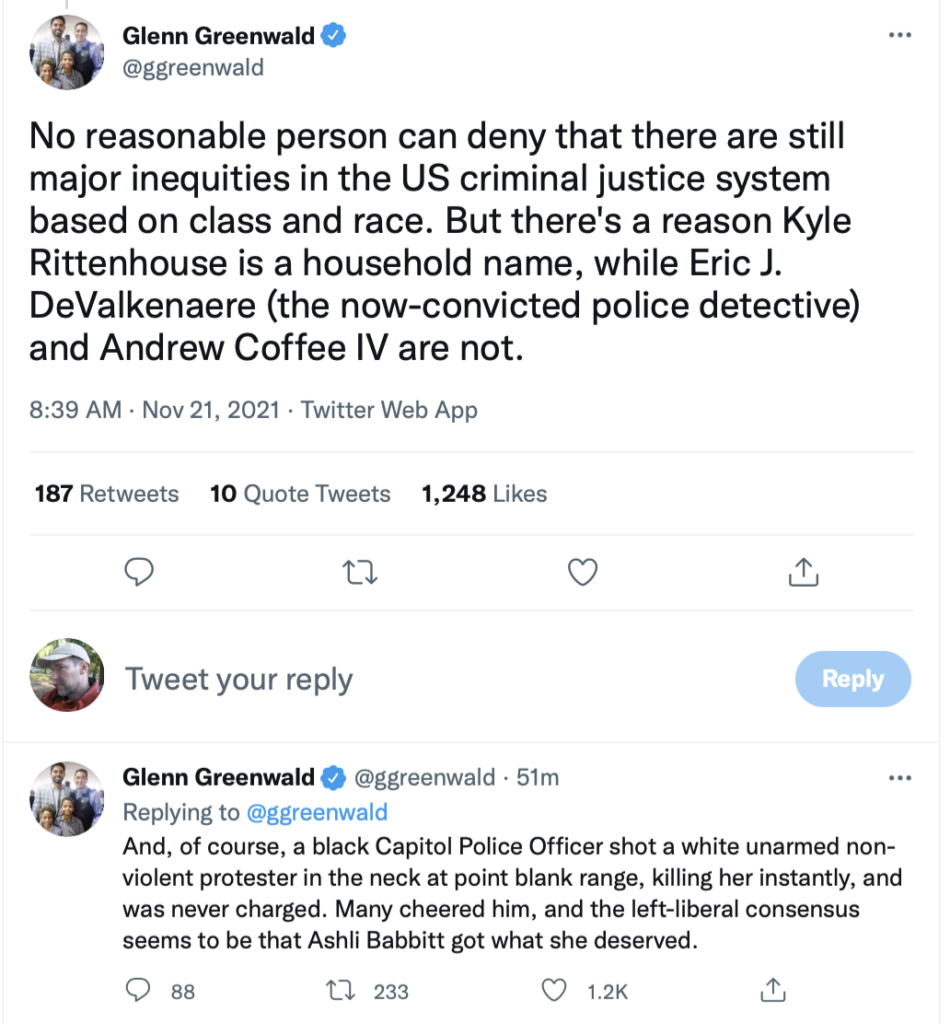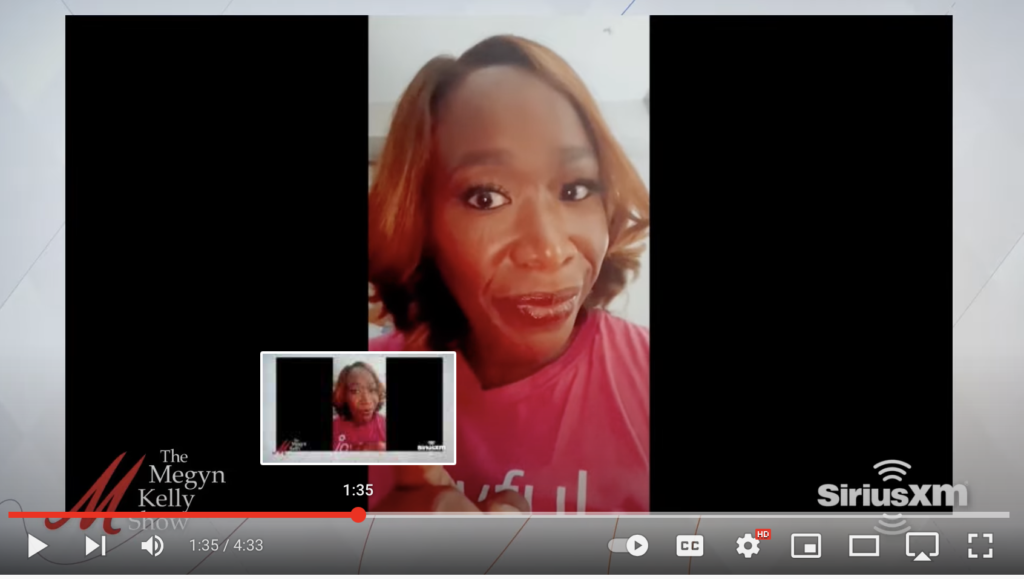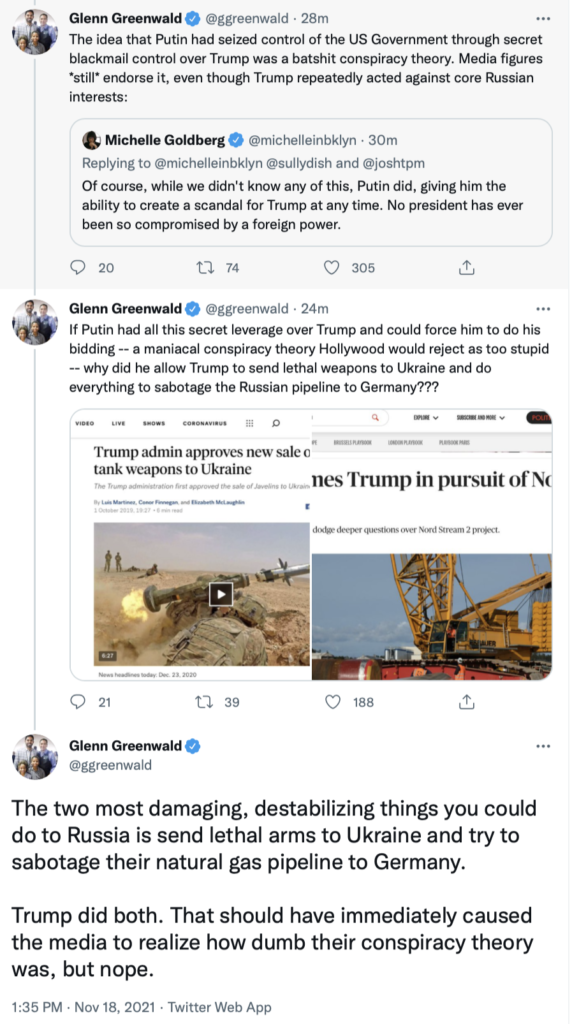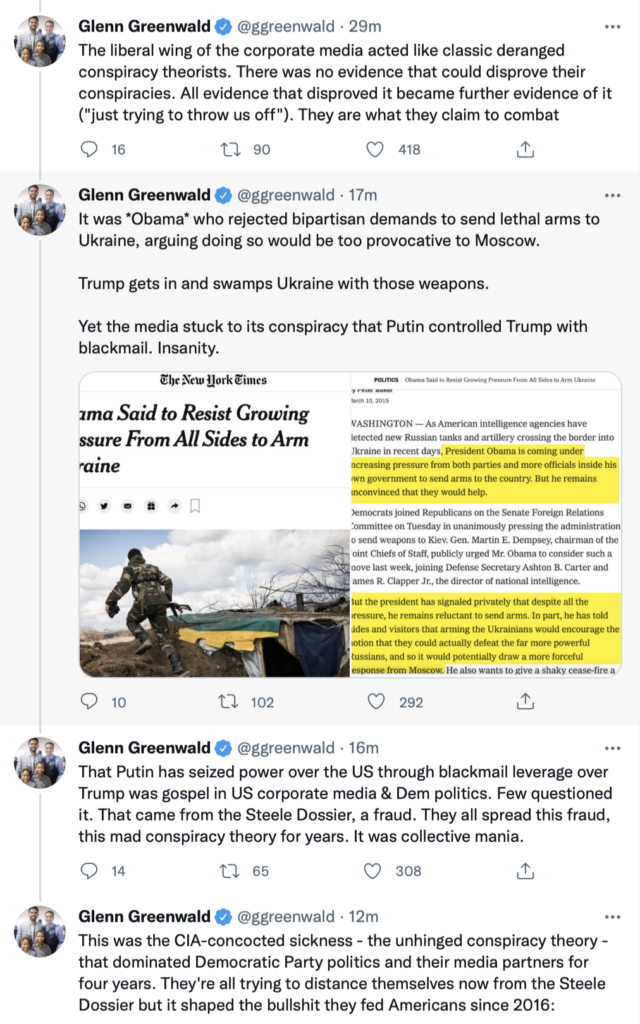Several things to read or watch featuring the widespread journalistic malpractice evident throughout the "news" coverage regarding Kyle Rittenhouse:
Drew Holden at Twitter.
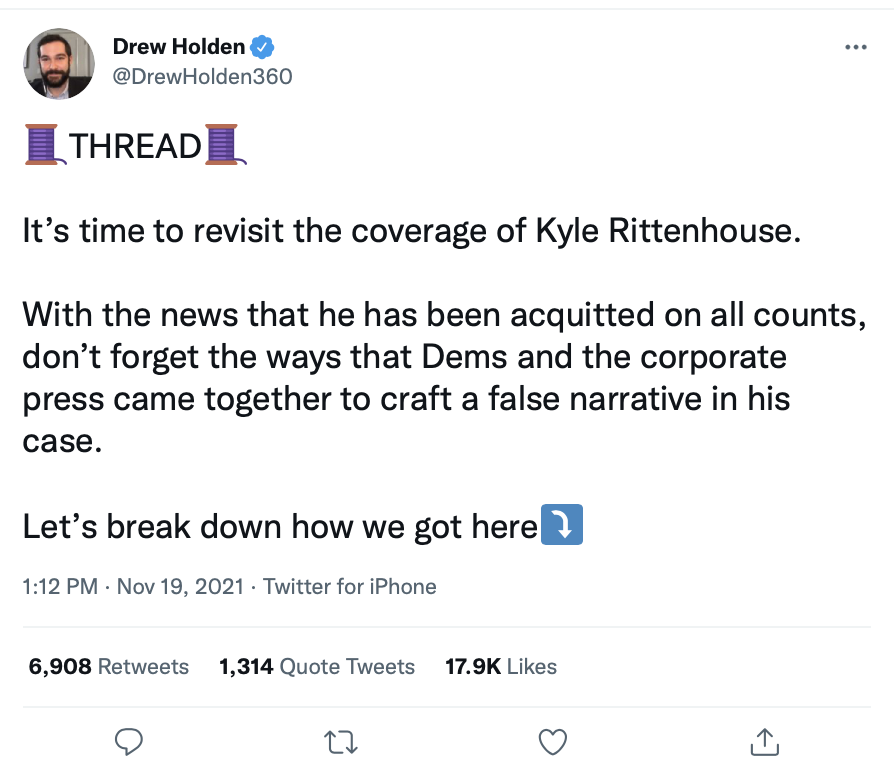
At Reason, article by Robby Soave
The ACLU Thinks Kyle Rittenhouse's Civil Liberties Got Too Much Protection
The American Civil Liberties Union should not cavalierly take the side of prosecutors against the concept of self-defense.
Matt Taibbi at Substack:
Now Rittenhouse has been found innocent, and surprise, surprise, the immediate reaction is that it can only be explained by white supremacy. To a degree, I don’t even blame people who’ve come to this conclusion, because it’s all they’ve heard for a year: Rittenhouse is a racist murderer who went way out of his way to shoot innocent people, and was given a pass by an evil system. . . .
Kyle Rittenhouse was found not guilty on all six charges today, already causing a great exploding of heads in the pundit-o-sphere. Unrest wouldn’t be surprising. How could it be otherwise? Colleagues in national media spent over a year telling the country the 18-year-old was not just guilty, but a moral monster whose acquittal would be an in-your-face affirmation of systemic white supremacy." . . .
Media figures got every element of this story wrong. . . Joe Scarborough on MSNBC said Rittenhouse unloaded “about sixty rounds” into the crowd (it was eight), adding in another segment that he “drove across state lines and started shooting people up,” and in still another that he was “shooting wildly, running around acting like a rent a cop, trying to protect property in a town he doesn't know.” (His father and other relatives live there). John Heilemann on the same channel said Rittenhouse was “arguably a domestic terrorist” who “crossed state lines to go and shoot people.” Bakari Sellers, CNN: “The only person who fired shots that night was Kyle Rittenhouse” (he didn’t fire first, and protesters actually fired more rounds).
In the early days after the shooting, there were widespread reports that Rittenhouse either was a “militia member” or “thought of himself as a militia member,” but these turned out to not be true (he was actually only a member of a Police Explorers program).
A scant few outlets bothered to do what The New Yorker did in July of this year, in examining each of these claims one by one. This involved simple things like citing the Anti-Defamation League report covering Rittenhouse:
"There is to date no evidence that Rittenhouse was involved with the Kenosha Guard or showed up as a result of their call to action. Nor is there evidence of ties to other extremist groups, either militia groups or white supremacist groups. Rittenhouse’s social media accounts provided no evidence of ties to extremism prior to the killings."
The New Yorker also took a sober look at the oft-howled objection that Rittenhouse “crossed state lines,” as if this were somehow an offense in itself (see the Matt Orfalea video above) and quickly determined that news outlets simply didn’t bother to ask a few basic questions about the case:
"Because he lived in Illinois, people assumed that he had travelled some distance, for nefarious purposes, and had “crossed state lines” with his rifle. (The Rittenhouse apartment was a mile south of the Wisconsin border, and Rittenhouse had been storing his gun in Kenosha, at the house of a friend’s stepfather.)" . . . "
The more they looked into it, the more reporters should have been able to see this verdict coming, and why. Instead, they picked a sloppy caricature on day one, and dug in. Now, mass audiences will be far more shocked than they should have been, and who knows what problems might arise from that.
Glenn Greenwald discussing the trial in the aftermath, nailing a prediction of what the allegedly pro-civil-rights ACLU would say in response to the verdict.
Greenwald shedding some much-needed light on a completely unprincipled GoFundMe announcement. Apparently the Constitutionally guaranteed right to an attorney means nothing to GoFundMe:
GoFundMe’s Terms of Service prohibit raising money for the legal defense of an alleged violent crime. In light of the Kyle Rittenhouse trial, we want to clarify when and why we removed certain fundraisers in the past.
Once charges for a violent crime were brought against Kyle Rittenhouse in 2020, GoFundMe removed fundraisers that were started for the defendant’s legal defense. We did this as part of our regular monitoring efforts; in addition to those fundraisers, our Trust & Safety team removed hundreds of other fundraisers between August and December 2020 — unrelated to Rittenhouse — that we determined were in violation of this long-standing policy.
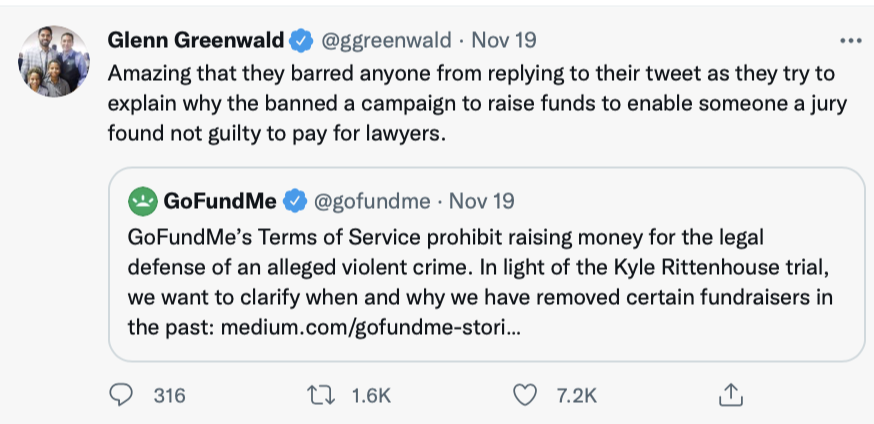
I'm now wondering . . . is THIS the policy of GFM that the Rittenhouse case violates, where people are trying to raise money for Kyle Rittenhouse's legal defense? If so, is GFM suggesting that it is EVER again public policy to raise $ to help someone have access than attorney? If so, that is absurd, in that the U.S. Constitution provides that criminal defendants have the right to counsel:
Amendment VI
In all criminal prosecutions, the accused shall enjoy the right to a speedy and public trial, by an impartial jury of the state and district wherein the crime shall have been committed, which district shall have been previously ascertained by law, and to be informed of the nature and cause of the accusation; to be confronted with the witnesses against him; to have compulsory process for obtaining witnesses in his favor, and to have the assistance of counsel for his defense.
Glenn on Tucker Carlson's Show:
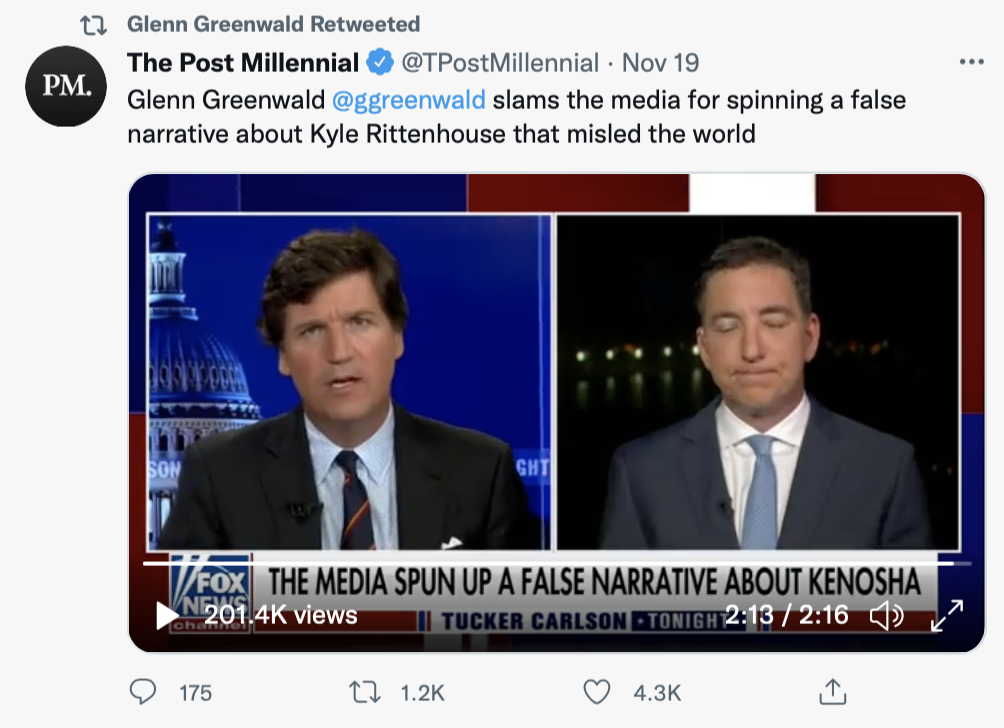
Glenn Greenwald pointing out Joe Biden's acquiescence to the mob:
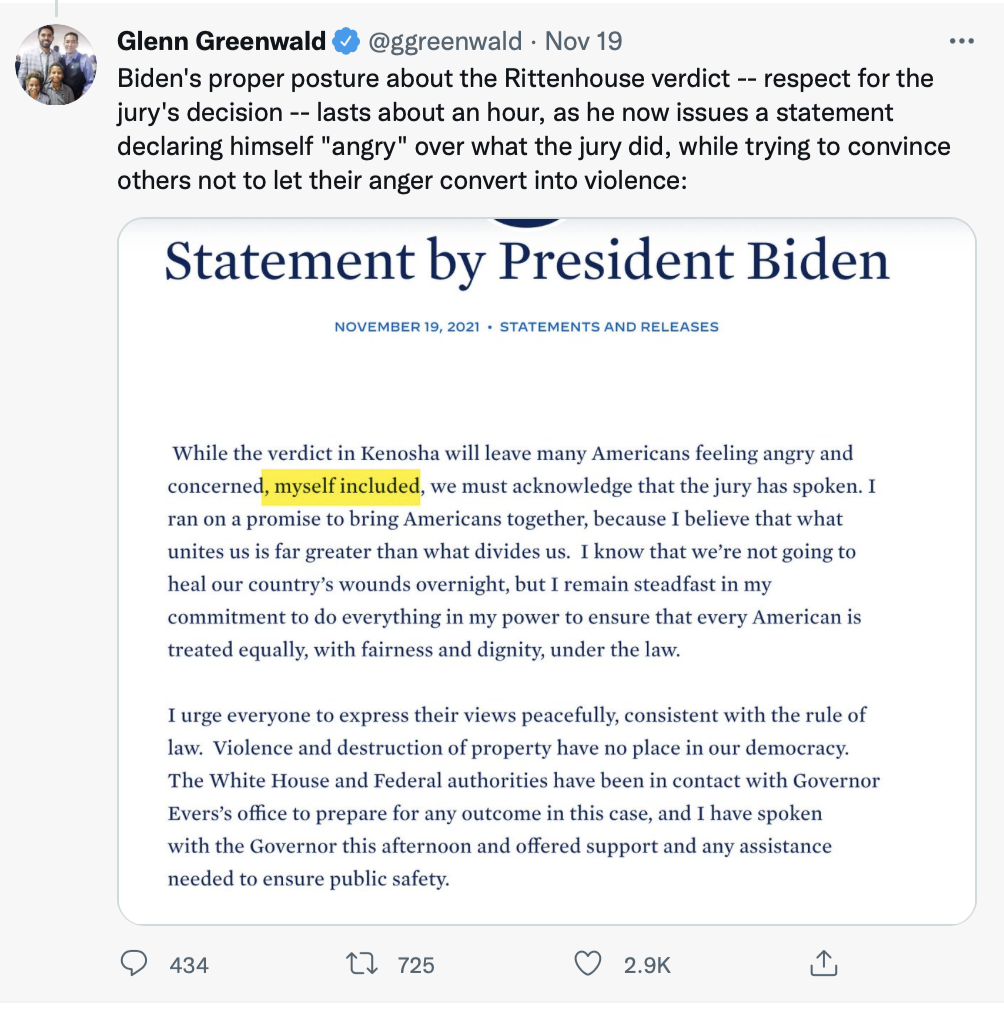
Here is what I thought was true about Kyle Rittenhouse during the last days of August 2020 based on mainstream media accounts: The 17-year-old was a racist vigilante. I thought he drove across state lines, to Kenosha, Wisc., with an illegally acquired semi-automatic rifle to a town to which he had no connection. I thought he went there because he knew there were Black Lives Matter protests and he wanted to start a fight. And I thought that by the end of the evening of August 25, 2020, he had done just that, killing two peaceful protestors and injuring a third.
It turns out that account was mostly wrong.. . .
This wasn’t a disinformation campaign waged by Reddit trolls or anonymous Twitter accounts. It was one pushed by the mainstream media and sitting members of Congress for the sake of an expedient political narrative—a narrative that asked people to believe, among other unrealities, that blocks of burning buildings somehow constituted peaceful protests.
[Added November 21 2021]
Glenn Greenwald:
No reasonable person can deny that there are still major inequities in the US criminal justice system based on class and race. But there's a reason Kyle Rittenhouse is a household name, while Eric J. DeValkenaere (the now-convicted police detective) and Andrew Coffee IV are not.
